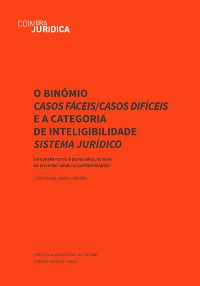Please use this identifier to cite or link to this item:
https://hdl.handle.net/10316.2/79503| DC Field | Value | Language |
|---|---|---|
| dc.contributor.author | Linhares, José Manuel Aroso | por |
| dc.date.accessioned | 2018-02-16T10:45:10Z | |
| dc.date.accessioned | 2020-04-09T14:14:38Z | - |
| dc.date.available | 2018-02-16T10:45:10Z | |
| dc.date.available | 2020-04-09T14:14:38Z | - |
| dc.date.issued | 2017 | - |
| dc.identifier.isbn | 978-989-26-1460-1 | por |
| dc.identifier.isbn | 978-989-26-1461-8 (PDF) | por |
| dc.identifier.uri | https://hdl.handle.net/10316.2/79503 | por |
| dc.description.abstract | Is the tension between the binomial easy cases/hard cases and the category legal system (or the reflection which critically witnesses it) a productive one, whilst understanding the pragmatic of plurality which characterizes contemporary legal thinking? In order to answer this question, the present essay reconstitutes the pragmatic easy/hard, whilst exploring two major trends: the first one corresponding to common law world’s fight against formalism (with very different fronts, from Law and Economics to Law and Literature, from Critical Legal Scholars to Hart’s critical positivism), the second one considering a certain theory of argumentation (and very specially Alexy’s and MacCormick’s proposals). The last part of the essay explores critically the possibility of refusing the binomial and the corresponding demarcation exercises, whilst «hearing» successively Dworkin and Castanheira Neves. | eng |
| dc.description.abstract | Estará o testemunho da dinâmica de oposição imposta pelo binómio relativo aos casos (à facilidade/dificuldade dos casos) e pela categoria sistema jurídico em condições de nos ajudar a entender a pragmática de pluralidade que caracteriza o discurso jurídico contemporâneo? Esta é a pergunta a que este estudo se propõe responder. A resposta constrói-se reconstituindo os dois grandes veios que hoje sustentam a pragmática casos fáceis / casos difíceis: o primeiro associado à multifacetada luta contra o formalismo de matriz anglo-saxónica (com frentes que vão do Law and Economics ao Law and Literature, passando pelos Critical Legal Scholars e pelo positivismo crítico herdeiro de Hart), o segundo justificado por uma certa teoria da argumentação (aquela que vemos sustentada por Alexy e MacCormick). A última palavra cabe a uma tentativa de experimentar crítico-reflexivamente a possibilidade de recusar o binómio e o exercício de demarcação que o forja (bem como os postulados que o alimentam) — tentativa que se cumpre «ouvindo» sucessivamente Dworkin e Castanheira Neves. | por |
| dc.format.extent | 184 p. | por |
| dc.language.iso | por | por |
| dc.publisher | Imprensa da Universidade de Coimbra | por |
| dc.rights | open access | por |
| dc.subject | easy cases/hard cases | eng |
| dc.subject | legal system | eng |
| dc.subject | formalism | eng |
| dc.subject | discretion | eng |
| dc.subject | argumentation theory | eng |
| dc.subject | open area | eng |
| dc.subject | principles | eng |
| dc.subject | casos fáceis/casos difíceis | por |
| dc.subject | sistema jurídico | por |
| dc.subject | formalismo | por |
| dc.subject | discricionariedade | por |
| dc.subject | teoria da argumentação | por |
| dc.subject | área aberta | por |
| dc.subject | princípios | por |
| dc.title | O binómio casos fáceis/casos difíceis e a categoria de inteligibilidade. Sistema jurídico: um contraponto indispensável no mapa do discurso jurídico contemporâneo? | por |
| dc.title.alternative | The binomial easy cases/hard cases and the category. Legal system: Is this an indispensable counterpoint, whilst mapping contemporary legal discourse? | eng |
| dc.type | book | por |
| dc.identifier.doi | 10.14195/978-989-26-1461-8 | por |
| uc.publication.digCollection | PB | por |
| uc.publication.area | Ciências Sociais | por |
| uc.publication.manifest | https://dl.uc.pt/json/iiif/10316.2/79503/160297/manifest?manifest=/json/iiif/10316.2/79503/160297/manifest | - |
| uc.publication.thumbnail | https://dl.uc.pt/retrieve/9214586 | - |
| uc.itemId | 57471 | - |
| item.grantfulltext | open | - |
| item.fulltext | With Fulltext | - |
| Appears in Collections: | Pombalina | |
Files in This Item:
| File | Description | Size | Format | |
|---|---|---|---|---|
| o_binomio.pdf | 1.75 MB | Adobe PDF |  |
Items in DSpace are protected by copyright, with all rights reserved, unless otherwise indicated.
